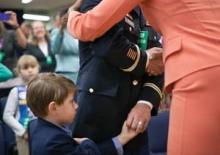BOSTON – In addition to the day-to-day stresses faced by most families, the children of active-duty service members must cope with the uncertainties of multiple deployments and the possibility that the parent will sustain life-altering injuries, develop mental illness, or die, according to a psychiatrist who studies and treats military families.
Of the more than 2.2 million U.S. service members on active duty, 44% have children, and two-thirds of those children are under age 11, noted Dr. Stephen J. Cozza, professor of psychiatry and associate director of the center for the study of traumatic stress at the Uniformed Services University of the Health Sciences in Bethesda, Md.
"Military kids are our nation’s kids: They serve as their parents serve, and also they’re our future, in the fact that more than any other youth group in the United States, military kids select military careers," he said at a conference on the complexities and challenges of PTSD and TBI.
Military families are protected from some common stressors because they receive steady incomes, housing, and free medical care, and have access to many personal and community services. At the same time, however, they are buffeted by the stresses of deployments, relocations, separation from extended family, and in the case of National Guard and Reserve members, fewer community support systems, Dr. Cozza noted.
He cited a 2008 Department of Defense survey of 13,000 spouses of active-duty service members; it showed that while 53% said they felt their children coped well or very well with the absence of one parent, 23% felt that their children coped poorly or very poorly. The spouses also reported that 60% of the children had increased fear or anxiety, 57% had increased behavior problems at home, 38% had decreases in academic performance, and 36% had increased problems at school.
Uncovering Emotional Issues in Military Children
Other studies have shown that children of deployed parents have higher degrees of emotional difficulties than national samples and more problems with school, family, and peers (J. Adolesc. Health 2010;46:218-23), and that parental stress and cumulative length of deployment predict depression and behavioral symptoms in children (J. Am. Acad. Child Adolesc. Psychiatry 2010;49:310-20).
Lengthy deployments create what are essentially single-parent families, with the at-home spouse left to cope with running a household as well as dealing with anxiety and personal stress. In some families, the stresses of long and/or frequent deployments can lead to child maltreatment, often in the form of neglect, Dr. Cozza said (Child Abuse Rev. 2008;17:108-18).
Potential risk factors for maltreatment include preexisting psychiatric problems of the child or stay-at-home parent; poorly functioning or highly stressed nondeployed spouses; multiple, lengthy, or dual-parent deployments; lack of social connections or resources; and parental factors such as anger, disconnection, or marital conflict.
Another factor that can have a profound effect on children is a combat or deployment-related injury to a parent. Such an incident might involve a fear of loss of that parent, family separations, hospital visits, a change in the injured parent’s personality, and a potential move away from the community after a discharge from service.
"Over 95% of the severely injured are male; they’re typically young men with a strong sense of themselves as parents and as fathers in a physical fashion, and depending upon the nature of the injury, the loss of a limb or a change in the capacity to engage, all of that really changes the way they relate to their children," Dr. Cozza said.
The rehabilitation process for such patients involves helping them to learn new strategies for relating to their children and families in the presence of the injury.
For parents, especially those who have sustained a traumatic brain injury or develop posttraumatic stress disorder, their self-image as the ideal parent might be challenged, and they must find a way to integrate their new sense of self into their relationships with their children, Dr. Cozza said.
The center for traumatic stress is currently recruiting for a national military family bereavement study. It is looking at preexisting personal and contextual factors; the influence of death and the circumstances surrounding it; early bereavement response and context; and outcomes such as grief reactions, psychiatric illness, traumatic response, complicated or prolonged grief, and functioning among individuals and families as a whole.
Dr. Cozza presented his findings at a symposium supported by the Home Base Program, a joint project of the Red Sox Foundation and Massachusetts General Hospital. He said he had no relevant financial disclosures.


